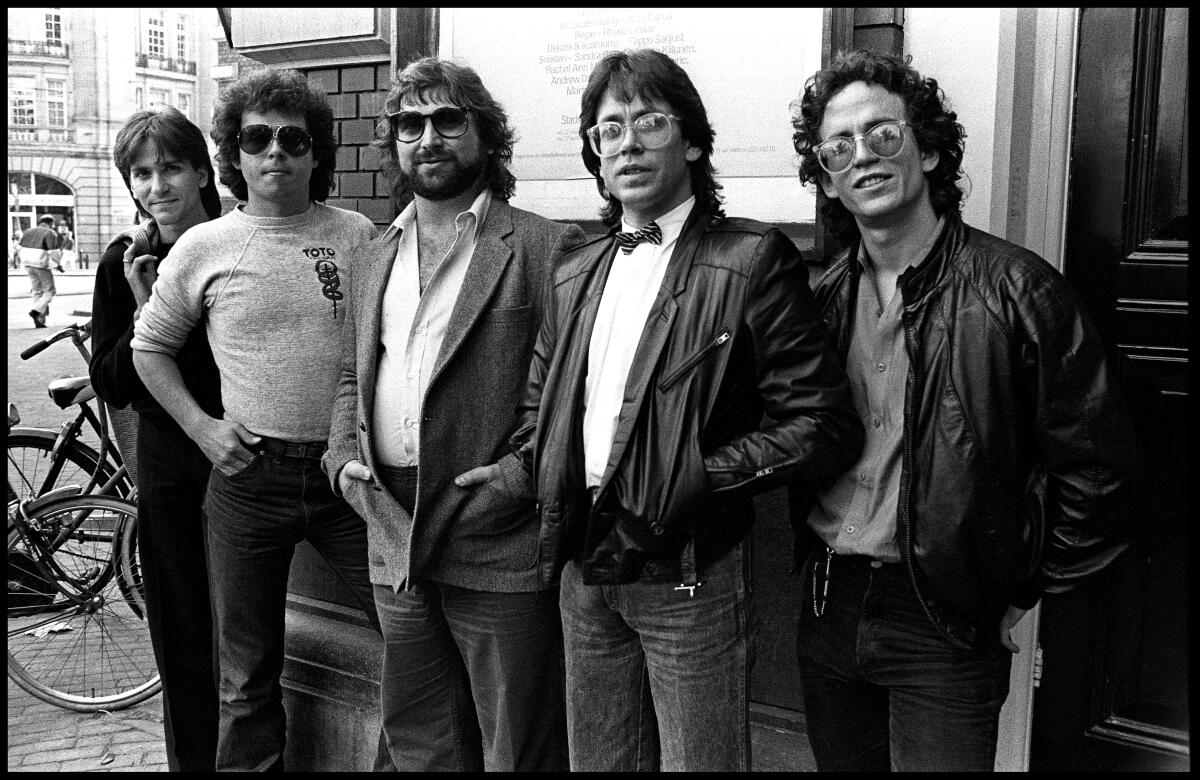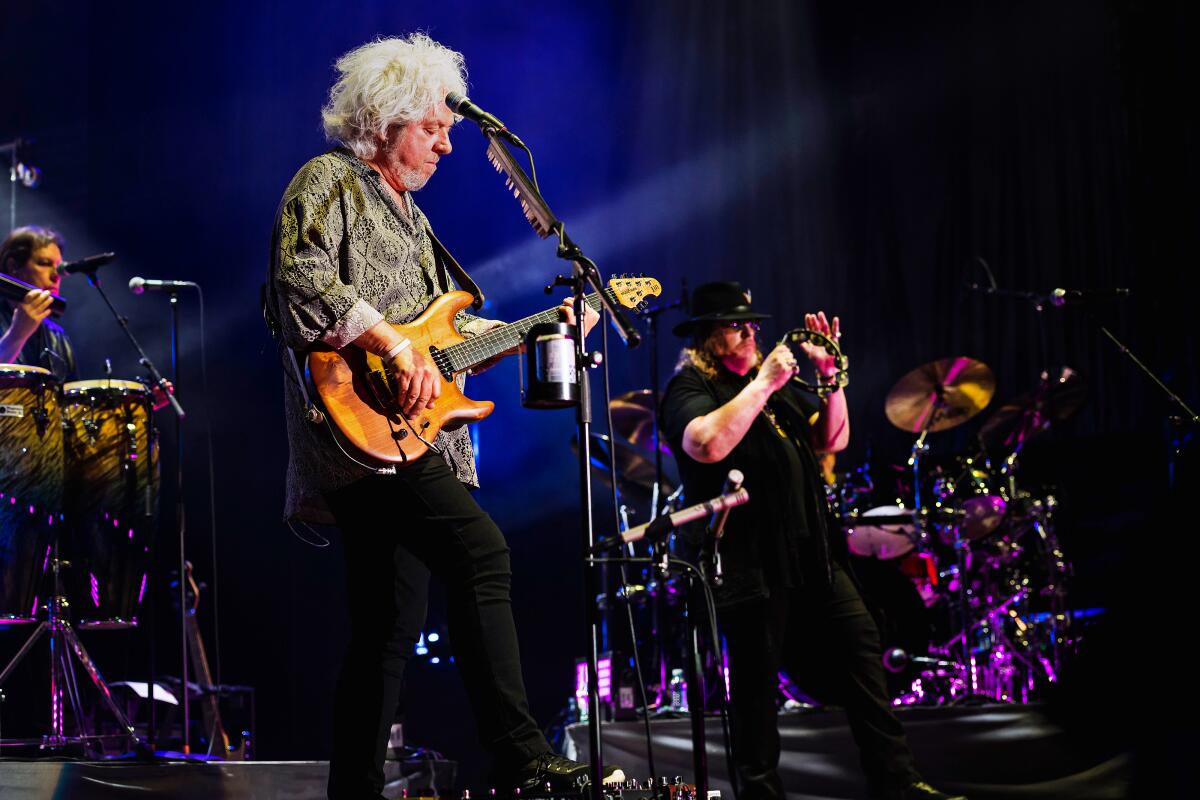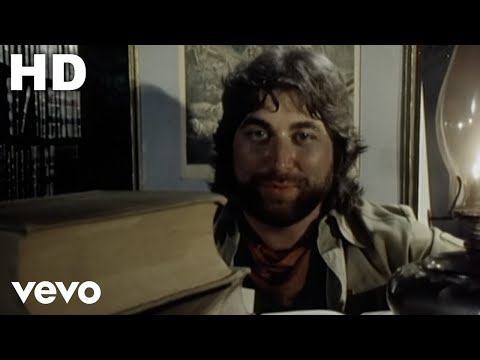Steve Lukather has lived in his house overlooking Studio City since 1979 — longer than you’d expect, perhaps, given that he bought the place before his band Toto exploded with its fourth album, 1982’s quadruple-platinum “Toto IV,” which won Grammy Awards for album and record of the year and spawned a chart-topping single in the yearning, sumptuous, still-inescapable “Africa.”
“I don’t live a big, huge, stupid life,” Lukather says, brushing away any surprise that he didn’t upgrade as soon as he had the chance. “I like my little crib in the hills.” With a laugh, he adds, “I got it before both divorces, and I got to keep it.”
Lukather is hanging at home on a recent afternoon, barefoot as he sips a nonalcoholic Corona, with his bandmates David Paich and Joseph Williams. The walls are lined with plaques commemorating the millions of records sold by Toto and by some of the countless acts with whom Lukather has played in the studio; books about the Beatles and about rock’s greatest album covers are piled neatly on the fireplace.
In the middle of the modest living room sits a gleaming Steinway grand piano — the very one, Lukather points out, on which he wrote two of Toto’s biggest ballads, “I Won’t Hold You Back” and “I’ll Be Over You,” as well as “Turn Your Love Around,” which George Benson took to No. 1 on Billboard’s R&B chart in 1982.
Yet Lukather isn’t living in the past. On Sunday night, nearly four decades after the band last grazed the Hot 100, Toto will headline the Hollywood Bowl for the first time. The hometown show is part of a broader resurgence for a group of guys in their 60s and 70s who currently boast 30 million monthly listeners on Spotify — more than the Rolling Stones, Bruce Springsteen or Eric Clapton — and who’ve survived long enough to see their once-derided yacht-rock vibe come back into vogue.
What’s more, Toto is on the road with two founding members in guitarist Lukather and keyboardist Paich at a moment when some classic rock bands are lucky to claim a single OG. (Take a bow, Foreigner.)
How to explain Toto’s endurance? For sure, the band has been lifted by a rising tide for all legacy acts: a kind of catch-’em-while-you-can mind-set that’s helped draw huge audiences to the likes of Billy Joel, the Eagles, Stevie Nicks and Dead & Company. In 2022, Toto opened for Journey on a U.S. arena tour; this summer, Journey is playing stadiums with Def Leppard.
There’s also the songs, of course — “a couple of which have just struck a nerve with people,” says Williams, who joined Toto as lead singer in 1986. He means “Hold the Line,” the band’s hard-riffing breakthrough, and the swank “Rosanna,” which beat Willie Nelson’s “Always on My Mind” and the theme from “Chariots of Fire” for record of the year at the Grammys. But what he really means is “Africa,” that fever dream about a rain-blessing excursion that’s been memed to high heaven, been used on “South Park” and “Stranger Things” and been covered by Weezer as a joke that no one can quite figure out. On Spotify, the song has racked up nearly 2 billion streams.
According to Williams, these hits have “lived past the knowledge of the band itself,” as he puts it.
“I was on an elevator once in a hotel when we were on the road, and there were two couples in there,” he says. “One woman was saying to the other woman, ‘What are you guys doing tonight?’ and she says, ‘We’re going to see that band Africa.’”
“Imagine their disappointment when we walked out,” Lukather says.
As individuals, though, the members of Toto — among the other founders were the brothers Jeff and Steve Porcaro on drums and keys, respectively — have inspired a certain fascination, at least among music nerds, with the way they balanced the band with busy side careers as studio players who shaped the slick but soulful sound of ’80s pop.
Michael McDonald’s “I Keep Forgettin’,” Don Henley’s “The Boys of Summer,” Michael Jackson’s uber-blockbuster “Thriller” LP — all featured Lukather, Paich and/or the Porcaros. Also: Olivia Newton-John’s “Physical,” a framed platinum copy of which hangs next to one of Jackson’s “Beat It” by Lukather’s dining room table.
“These guys in their sleep could do it pretty much on the first take,” says David Foster, the veteran record producer who started out as a fellow session musician — you can hear both him and Paich behind Benson on “Turn Your Love Around” — before becoming the one hiring Toto’s members to play on hit records like Chicago’s “Hard to Say I’m Sorry.”
“It was just an amazing array of musicians,” he adds. “David Paich has the best feel of any piano player I’ve ever met.”

Toto in Amsterdam in 1982: Mike Porcaro, from left, Steve Lukather, David Paich, Jeff Porcaro and Steve Porcaro.
(Rob Verhorst / Redferns / Getty Images)
Toto’s high-gloss only-in-L.A. aesthetic didn’t age well into the ’90s and early 2000s, when rock went grungy then garage-y; even in Toto’s heyday, critics dismissed the band as hot-dogging technicians. (Rolling Stone’s oft-quoted dismissal: “All chops and no brains.”)
Yet a new generation of acts — Haim, Bon Iver, the War on Drugs, Mk.gee — has lovingly embraced the intricate sense of craft that Toto built into its records. And though the members’ session work wasn’t highly visible in the early, no-liner-notes era of digital music, their contributions are now eagerly tracked on websites like Discogs and in music docs like this year’s “The Greatest Night in Pop,” about the recording of “We Are the World” — one more defining mid-’80s smash that featured Paich and Steve Porcaro on keyboards.
“Everybody knows Toto, but you only really know Toto when you know all the other things they worked on and how sick they were in any circumstance,” says Ethan Gruska, a young L.A. musician and producer who’s convened a not-dissimilar crew of musicians to make not-dissimilarly tasty records with Phoebe Bridgers and Ryan Beatty. “Obviously, I’m biased” — Gruska is Williams’ nephew — “but my friends who are players have always thought that what they established was cool.”
Which isn’t to say that Lukather, Toto’s intellectual thought leader, is without his share of older-rock-star grievances. Among them:
- the term “yacht rock” (“We deserve a yacht, don’t you think?” he asks)
- the fact that Toto hasn’t been inducted into the Rock & Roll Hall of Fame (“It’s not based on stats — it’s based on the taste of 80-year-old men”)
- clueless record execs (“Walter Yetnikoff knew nothing about music,” he says of the late CBS Records boss)
- Weezer frontman Rivers Cuomo’s unwillingness to meet Toto after its hit “Africa” cover (“The guy just iced me”)
Still, asked whether he identifies a bitterness within himself, Lukather scoffs.
“F— no,” he says. “How could I be bitter with a career that’s almost 50 years old?”
Toto formed out of friendships struck up at Grant High School in the Valley. Nobody called anybody “nepo babies” back then, but the members of Toto were all connected: Paich’s father was Marty Paich, the arranger and conductor known for his work with Ray Charles and Barbra Streisand, among many others; the Porcaro brothers were the sons of the jazz drummer Joe Porcaro; Lukather’s dad worked in TV production on shows like “I Dream of Jeannie.” (No wonder that when they needed a new singer after frontman Bobby Kimball left the band, they clicked with Williams, son of the celebrated film composer John Williams.)
The players had already proved themselves as session guys — Boz Scaggs’ “Silk Degrees” was a crucial showcase — when they cut Toto’s self-titled debut in 1978 and scored a top 10 hit with “Hold the Line.” For the next year’s “Hydra,” “we started to go all Dungeons & Dragons on everybody,” Lukather says; the result whiffed, as did 1981’s “Turn Back.” But with “Toto IV” the band found just the right blend of groove, melody and texture, a sweet spot it stayed in for a few glorious years.
Did Toto’s famous perfectionism in the studio ever suck the joy out of making music?
“Sometimes,” Williams says, shaking his head beneath a black cowboy hat. “I spent a few times behind the glass where the joy had left my body.”
Lukather, for one, still loves getting deep into the weeds of recording; last year he released an album of new songs under his own name even though he knew he wouldn’t make any money from it. The paying work — not to mention the validation he’s grown accustomed to receiving from an audience — is onstage, which is one reason he went into something of a tailspin during the pandemic when live music ground to a halt.
The guitarist doesn’t want to go into detail about it today. But as he told the music-industry analyst Bob Lefsetz last year in an episode of Lefsetz’s podcast, Lukather struggled with depression and a subsequent bout with ketamine abuse. So when Toto finally got back on the road with Journey two years ago, he says, “it made me appreciate life like I’ve never appreciated it before.”
The tour reenergized Toto’s live business as well. “People saw us and went, ‘Wow, these guys are actually good,’” Lukather says.

Surely, the members of Toto saw the recent news that Journey’s Jonathan Cain had filed a lawsuit accusing the band’s Neal Schon of misusing the band’s corporate credit card — while the two are in the midst of playing concerts together? Williams laughs. “They need the money from the shows to keep suing each other,” he says.
“We’ve gotten close to that,” Lukather adds. “It’s not pleasant.” (Fun classic-rock fact: Lukather’s son is married to Cain’s daughter.)
Lukather doesn’t name names in regards to this almost-litigation. But asked why his solo record wasn’t a Toto album — Paich and Williams are both all over it — he says, “Don’t want to deal with fighting people over semantics.” Susan Porcaro Goings, widow of the late Jeff Porcaro (who died in 1992), has sued the band over her share of Toto’s royalties; Steve Porcaro quit Toto in 2019. Why did Steve Porcaro leave?
“The last tour he was on, he was so miserable every day,” Lukather says. Reached on the phone, Porcaro says, “I don’t know what he’s talking about. I was very, very happy on the road. I just needed a break.”
Last month, Porcaro announced that he’d sold the rights to his music — including the Toto songs he had a hand in as well as the indelible Michael Jackson hit “Human Nature,” which he co-wrote with lyricist John Bettis — in a deal with the Jackson estate and the music company Primary Wave. (The New York Times reported that the deal, the latest in a long series of catalog transactions involving veteran pop and rock artists, was “estimated in the low eight figures.”)
“OK, so 10, 11, 12 million?” Lukather asks. “I don’t know, I haven’t talked to him about it. But most of the people I know that have sold have regretted it.” He’s been approached, he adds, and said no every time. Lukather’s view is that it’s smarter to resist a one-time payout — “Living in California, they take 50%, boom, right off the bat” — and instead keep the royalty checks coming “a couple times a year,” he says.
“Also, you have no say [after selling your rights] if somebody wants to make a toilet-paper commercial out of one of your songs,” he adds. “That’s my life and my creativity balled into this thing called music. It’s personal.”

Steve Lukather and Joseph Williams of Toto perform in Madrid in July.
(Mariano Regidor / Redferns / Getty Images)
For these reasons and others, Lukather serves as Toto’s manager, which he reckons keeps him busy on the phone and the computer for at least four hours every morning before whatever musical labor the day holds. Like the catalog buyers, would-be managers have tried to woo Toto.
“There’s been a lot of fabulous people — put ‘fabulous’ in quotes — and they all have 20 acts yet still find time to play golf every day,” he says. They’ll promise they can work untold wonders for the band, he adds. “It’s like dating — you’ll say anything you can think of to get those pants off.”
Which, considering the strong shape Toto is in, just makes Lukather laugh. “If we were sucking the last bit of air out of the tire, it’d be a different conversation,” he says. “But we’re headlining a stadium show in Amsterdam in February. We’re doing 80,000 people at a festival in Mexico City with Paul McCartney and Green Day, and our name’s right there. It’s astounding to me, man.
“This is getting bigger, not smaller. I’ll take the ride for a while.”

